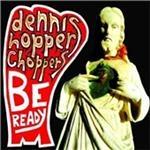
Dennis Hopper Choppers Be Ready
(D Wink)
Unwieldy though it is, Ben Nicholls’ one-man-band name “Dennis Hopper Choppers” certainly conjures a distinctive image. Anyone who saw David Lynch’s 1986 masterpiece Blue Velvet will immediately call to mind the indelible memory of Dennis Hopper’s character Frank Booth, the film’s sadomasochistic villain – one of the most psychologically disturbing characters in cinema. What made Hopper’s portrayal so unsettling is that he wasn’t relentlessly ultraviolent; perhaps the scariest scenes were when Frank showed emotional vulnerability, silently weeping while mouthing along to Roy Orbison’s In Dreams.
His intense reaction to the apparently inoffensive ballad was one of the strongest signs of Frank’s madness, forcing you to reconsider the impact that rock and roll could have. Dennis Hopper Choppers shamelessly takes cues from Orbison’s explorations of that darker side of rockabilly – the intimate rather than the showy, meditations rather than catchy toe-tappers. His baritone is highly reminiscent of romantic crooners like Orbison, Scott Walker, even Elvis Presley, but without the radio refinement of these singers, keeping things on the minor-key, Frank Booth side of pop.
But Nicholls doesn’t so much take inspiration from these 50s/60s balladeers as imitate that rockabilly era – there’s the odd bit of booze-soaked blues (My Destiny) and surf-rock (Razor Gang, All Could Come True), but since the Pulp Fiction soundtrack I reckon most listeners will see these styles as homogenous. His songwriting is an adept emulation of his obvious American heroes, which means that his lyrics are so drowned in cliché that it’s difficult to point to any trace of individuality.
However, Nicholls is clearly a talented arranger, and his liberal string and horn embellishments allow his songs to diverge from those influences. He’s made a wise move to abandon his one-man-band gimmick (impressive though it is), in the studio, allowing more flexibility and a bigger sound on record. These points of deviation are also the highlights – I wasn’t expecting the free-jazz sax at the end of Number 1, or the tour-de-force Spaghetti Western-esque bits of Moscow Nights, and these sections prove that Nicholls’ instrumentation is much more intriguing than the songs themselves.
Rockabilly isn’t a genre that’s likely going to undergo any sort of revival, and it’s hard to see to whom this record will appeal these days, but Nicholls does what he does with enough aplomb to make it worthwhile, if you can ignore the vapid lyrics. And if you picture Dennis Hopper brimming with tears and lip-syncing to this music, stroking his blue square of velvet, you get a sense of this record’s dark potential.
2 August, 2011 - 19:01 — Stephen Wragg